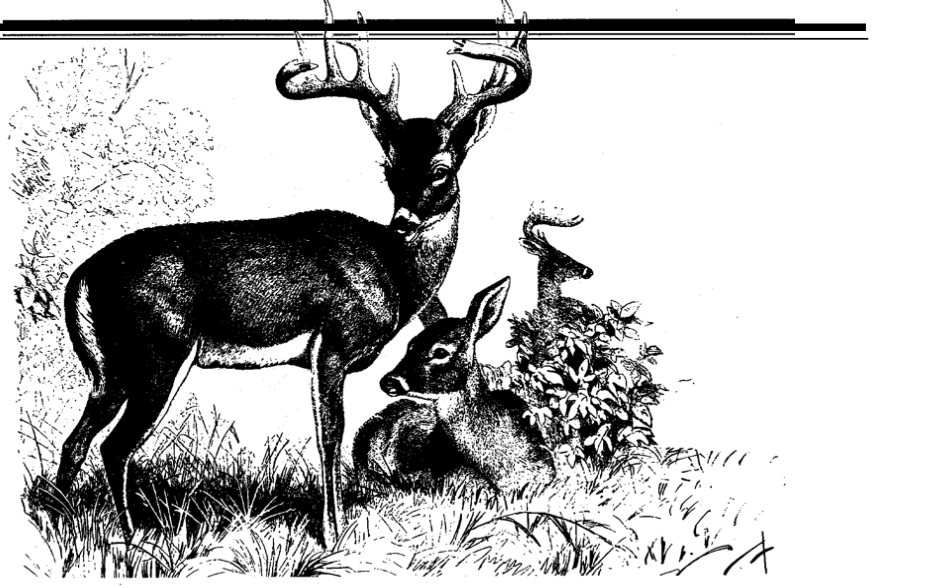Fear Deer «Chessex»

Creature Metadata
- Reported By
- Dan Snuffin
- Source
- Dragon Magazine 108
- Role
- Monster
- Base Stock
- White-tailed deer
- MCC Stat Block
- Chessex 'Fear Deer' (5d10 (27)): Init +2; atk antler gore melee -1 (1d4-2); AC 15; HD 3D7 hp 12 each; MV 31' ; 1d20; SV Fort -1, Ref +0, Will -2
- Mutations
- Absorption (radiation), and fear generation
Combat & Physical Stats
- Number Appearing
- 5d10
- Morale
- 3
- Hit Dice
- HD 3D7
- Armor
- 5 (AC 15)
- Size
- Small 70 cm tall at shoulder
- Movement
- MV 31'
- Attack
- Antler Gore melee -1 (1d4-2)
Ability Scores
- MS:
- 5
- PS:
- 4
- IN:
- 2
- DX:
- 11
- CH:
- 2
- CN:
- 8
Ecology & Logistics
- Frequency
- Common
- Organization
- Unknown
- Activity Cycle
- Day
- Diet
- Grasses and shrubs
- Habitat
- Temperate grasslands and forests
- Tech Level
- 0 - 0
- Artifacts
- Unknown
Description (Initial Observations): The chessex are small, mutated deer that are pale yellow in color. They avoid most encounters by running away or by using their fear generation powers on carnivores, who have learned to leave the chessex alone. If cornered or surprised, chessex can attack with their antlers, which are hollow and filled with poisonous fluid that can be injected into antler wounds. This poison causes affected victims to lose 1 strength point per Action Turn until a strength of 3 is reached, at which time the victim must sit and rest for as many hours as strength points were lost. At the end of that time, the victims strength returns to normal.Chessex are herbivorous and can be found in large herds in the American Midwest. Human and humanoid barbarian tribes find the chessex highly important,as the poison from their antlers can be drained, allowed to thicken for 1d4 days, and made into Intensity Level 8 poison for use on weapons. This poison causes a strength loss of only 1d4 points. The tough, leathery hides of the chessex are used as armor (equal in all respects to leather armor), and the meat of these mutant deer has proved to be quite tasty. Tribesmen use missile weapons and traps to bring down chessex. Because of their mutations, these creatures cannot be domesticated. Chessex have learned to travel radioactive lands in order to escape hunters.
Behavior & Society
- Reactions
- No known interactions
- Behavior
- Behavior modeling incomplete
- Repair & Healing
- Behavior not recorded
- Society
- Anthropological studies incomplete
Additional Creatures
0th Edition - Metamorphosis Alpha
1st Edition
2nd Edition
3rd Edition
4th Edition
5th Edition
6th Edition
6th Edition - Beyond the Horizon
6th Edition - Machines & Mutants
Badder to the Bone
Badder to the Bone II
Dragon 98 - Ares Section June 1985 - GW2
Dragon Magainze 085
Dragon Magainze 130
Dragon Magazine 075
Dragon Magazine 098
Dragon Magazine 104
Dragon Magazine 108
Dragon Magazine 113
Dragon Magazine 126
Dragon Magazine 130
Famine at Fargo 7th Edition
GW01 - The Legion of Gold
GW02 - Famine in Far-Go
GW03 - The Cleansing War of Garik Blackhand
GW04 - The Mind Masters
GW05
GW05 - Rapture of the Deep
GW06 Module
GW06 Module, MM2
GW07 Module
GW08 Module
GW09 Module
GW10 Module
METAMORPHOSIS ALPHA TO OMEGA ADVENTURE 1: The Quest for Elvis
MM2
Master's of the Earth Campaign: MA-1 The Trials
Master's of the Earth Campaign: MA-4 To the Rescue
Master's of the Earth Campaign: MA-5 The Savage Beast
Master's of the Earth Campaign: MA-6 City of the Ancients
Masters of the Earth Campaign: MA-2 The Town of Boze
Mud Glat Walker
Omega Project
Paths of the Lil in White Dwarf
Polyhedron 02
Polyhedron 03
Polyhedron 10
Polyhedron 14
Polyhedron 144
Polyhedron 15
Polyhedron 27
Polyhedron 44
Ted Tschopp
The Albuquerque Starport
The Barracks Raid
There will be War
Trouble in Freesboro
White Wolf: Midnight in the Mystery Garden
Webmentions
Connect your blog or website to this post via Webmentions. Link to this article and your response will appear below, fostering a web-wide discussion. Supports comments, likes, and reposts from any Webmention-enabled site.